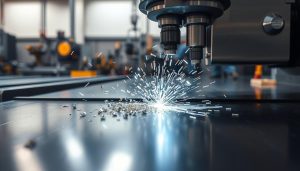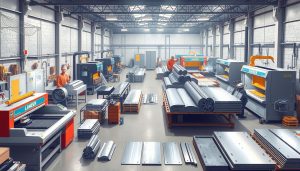In the world of construction, manufacturing, and DIY projects, fasteners play a crucial role in holding materials and components together. From simple nails to complex industrial-grade bolts, the variety of fasteners available can be overwhelming. This comprehensive guide will explore the different types of fasteners, their applications, and how to choose the right one for your specific needs.
Key Takeaways
- Discover the most common types of fasteners, including screws, bolts, nuts, and rivets.
- Learn about specialized fasteners like wood screws, socket head bolts, and lock washers.
- Understand the importance of material selection, strength, and corrosion resistance when choosing fasteners.
- Discover tips for finding the right fastener supplier to meet your project requirements.
- Gain a comprehensive understanding of the fastener landscape to make informed decisions for your next project.
Common Types of Fasteners
When it comes to joining components, threaded fasteners like screws, bolts, and nuts, as well as non-threaded fasteners like rivets, are the building blocks of countless projects. Each type of fastener offers unique advantages and serves specific purposes, making them indispensable tools in the world of construction, manufacturing, and DIY.
Screws
Screws are perhaps the most versatile of all fasteners. They come in a wide range of sizes, materials, and head styles, allowing them to be used in a variety of applications. Threaded screws are commonly used to secure two or more materials together, with the thread providing a secure hold. From wood screws to machine screws, the humble screw is a staple in every toolbox.
Bolts
Bolts are another essential type of threaded fastener. Unlike screws, bolts feature a larger diameter and are often used in applications that require greater strength and load-bearing capacity. Bolts are typically used in conjunction with nuts, creating a reliable and adjustable connection between components.
Nuts
Nuts are the perfect complement to bolts, forming a secure and adjustable joint. They come in a variety of shapes and sizes, with different features like lock nuts and flange nuts, to meet specific needs. Nuts are crucial for maintaining the integrity of bolted connections, ensuring that the components remain firmly in place.
Rivets
Rivets are a type of non-threaded fastener that create a permanent connection between two or more materials. Unlike screws and bolts, rivets are typically installed by driving them through the materials and then deforming the end to create a secure hold. Rivets are commonly used in aircraft, automotive, and construction applications where a strong, permanent joint is required.
Understanding the unique characteristics and applications of these common fasteners is essential for any project, whether you’re a professional or a DIY enthusiast. By selecting the right fastener for the job, you can ensure the strength, durability, and aesthetics of your final product.
“The right fastener can make all the difference in the success of a project.”
Specialized Fasteners
In the world of fasteners, certain specialized types are designed to meet the unique demands of specific applications or materials. These specialty fasteners and application-specific hardware play a crucial role in various industries, from construction and woodworking to automotive and aerospace. Let’s explore three such specialized fasteners: wood screws, socket head bolts, and lock washers.
Wood Screws
Wood screws are a popular choice for securing components to wooden surfaces. Unlike standard screws, wood screws feature a sharper point and a coarse thread pattern that allows them to grip and penetrate wood more effectively. They are commonly used in furniture assembly, cabinetry, and other woodworking projects where a strong, secure connection is essential.
Socket Head Bolts
Socket head bolts, also known as Allen bolts, are a type of specialty fasteners that feature a recessed hexagonal socket in the head. This design allows for a secure and precise tightening using an Allen wrench or hex key. Socket head bolts are often used in applications where a low-profile, flush finish is required, such as in machinery, electronics, and aerospace components.
Lock Washers
Lock washers are specialized application-specific hardware designed to prevent fasteners from loosening over time due to vibration or dynamic loads. They feature a split or serrated design that grips the surface of the nut or bolt, creating increased friction and resistance to rotation. Lock washers are commonly used in automotive, industrial, and construction applications where maintaining a secure connection is crucial.
By understanding the unique features and applications of these specialized fasteners, professionals and DIY enthusiasts can make informed choices to ensure the success and longevity of their projects.

How to Choose the Right Fastener for Your Project
Selecting the appropriate fastener for your project is crucial to ensure the overall strength, durability, and safety of the final product. When it comes to fastener selection, several key factors must be considered, including material compatibility, load-bearing capacity, and corrosion resistance.
Material Considerations
The choice of fastener material can significantly impact the performance and lifespan of your project. Common fastener materials include steel, stainless steel, brass, and aluminum, each with its own unique properties and suitability for different applications. Carefully evaluating the material compatibility between the fastener and the surrounding components is essential to prevent galvanic corrosion and other compatibility issues.
Strength and Load-Bearing Capacity
The fastener’s strength and load-bearing capacity are critical factors, especially for projects that will be subjected to high levels of stress or vibration. Determine the maximum load your project will need to withstand, and select fasteners with the appropriate tensile strength and shear capacity to ensure reliable performance over the long term.
Choosing Fasteners Based on Corrosion Resistance
- Evaluate the environmental conditions your project will be exposed to, including humidity, saltwater, or chemical exposure.
- Select fasteners with the appropriate corrosion resistance, such as stainless steel or coated fasteners, to prevent premature failure due to corrosion.
- Consider using secondary corrosion-resistant measures, such as sealants or anti-corrosion coatings, to further protect your fasteners.
By carefully considering the material, strength, and corrosion resistance requirements of your project, you can ensure that you select the right fasteners to deliver reliable performance and long-lasting results.
| Fastener Material | Corrosion Resistance | Tensile Strength | Typical Applications |
|---|---|---|---|
| Steel | Moderate | High | General construction, automotive, machinery |
| Stainless Steel | Excellent | High | Marine environments, food processing, chemical industries |
| Brass | Good | Moderate | Plumbing, decorative applications |
| Aluminum | Good | Moderate | Lightweight structures, electronics enclosures |
How to Choose the Right Supplier for Fasteners
Selecting the right fastener supplier is crucial for the success of any project. When it comes to fasteners, quality assurance and product availability are paramount. By carefully evaluating potential suppliers, you can ensure that you get the high-quality fasteners you need, when you need them.
Factors to Consider When Choosing a Fastener Supplier
When choosing a fastener supplier, there are several key factors to consider:
- Product Quality: Look for a supplier that offers consistently high-quality fasteners, ensuring they meet or exceed industry standards. Check for certifications and quality assurance measures.
- Product Availability: Ensure the supplier has a wide range of fasteners in stock, able to meet your project’s needs. Reliable and timely delivery is essential.
- Competitive Pricing: Compare pricing from multiple suppliers to ensure you’re getting the best value for your money, without sacrificing quality.
- Customer Service: Evaluate the supplier’s responsiveness, problem-solving abilities, and overall customer service. A reliable and helpful supplier can make all the difference.
| Supplier A | Supplier B | Supplier C |
|---|---|---|
| ISO 9001 Certified | 20+ Years of Experience | Wide Product Range |
| Next-Day Delivery | Competitive Pricing | Excellent Customer Service |
| Extensive Inventory | 100% On-Time Delivery | Fast Order Processing |
By considering these factors, you can find a fastener supplier that provides the quality, availability, and customer service you need to ensure the success of your project.

“Choosing the right fastener supplier is the foundation for any successful project. It’s not just about finding the cheapest option, but about partnering with a reliable, high-quality provider.”
Conclusion
As we’ve discovered throughout this comprehensive fastener guide, understanding the different types of fasteners and making informed choices are crucial for the success of any project. Whether you’re working on a home improvement task, an industrial application, or a complex engineering endeavor, the right selection of hardware can make all the difference.
By familiarizing yourself with the common and specialized fasteners, considering factors like material, strength, and corrosion resistance, and partnering with a reliable hardware selection supplier, you can ensure the long-term integrity and safety of your endeavors. Remember, investing the time to thoroughly research and select the appropriate fasteners is a small but vital step towards achieving project success.
As you move forward with your next project, keep this guide as a reference to navigate the world of fasteners with confidence. Embrace the knowledge you’ve gained, and let it empower you to make informed decisions that will contribute to the overall success of your undertakings. The key to unlocking outstanding results lies in your ability to select the right fasteners for the job.





